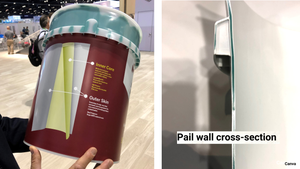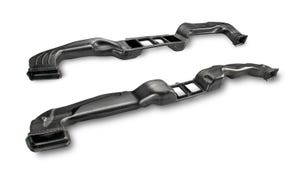A Middle East molder eyes new markets
October 31, 2000
When IMM met recently with the managers of the first plastics molding company established in Saudi Arabia, it came as a bit of a surprise to find that a key element of its marketing andmanagement strategy is identical to that of many molders in NorthAmerica, not to mention Europe and the Far East. Saudi PlasticsFactory (SPF), based in the capital city of Riyadh, believes qualityis the most important element of a growth strategy that takesadvantage of the unique elements of its location. And like moldersin the U.S. and elsewhere, SPF is using quality to cross bordersand oceans in an effort to explore and mine opportunities in othercountries and markets.
Regional Economies
The prosperity brought by oil has conferred a relatively highstandard of living on the approximately 15 million Saudi citizens.As a result, labor is recruited from abroad for service, manual,and technical jobs. There are about seven million expatriatesin Saudi Arabia, primarily from countries to the east such asPakistan, Indonesia, and the Philippines.
Fawaz AlKaaki, president and gm, says that despite the advantageof low labor cost in Saudi Arabia, SPF is intentionally subordinatingthis factor to quality. He is firmly convinced that quality isthe only way SPF can achieve its ambitious growth plans in theMiddle East and beyond.
Founded in 1962 by its current chairman H.R.H. Hussam Bin SaudBin Abdul Aziz, SPF has since expanded many times. Two of thefive buildings at its site on the outskirts of Riyadh have beenadded within the last two years. Total work space is now morethan 380,000 sq ft.
Today there are 60 injection molding machines ranging from50 to 850 tons, and except for five older systems, all are recentBattenfelds. Three new Battenfeld machines will be installed beforethe end of this year. One is a 1300-ton machine from Battenfeld'sthree-platen HM Series that will extend the company's productrange on the high end.
Quality and Growth
Besides the new injection machines, the company is increasingits moldmaking capacity. The company's moldmakers have built sometooling but have been mostly occupied with maintenance of morethan 1500 molds. An investment of more than $1 million will bringin CNC and EDM systems, a high-speed milling center, a lathe,and more to follow.
Quality is nothing new at SPF. The company has won internationalawards for it and has been certified ISO 9002 since 1997. Workis now in process to obtain ISO 14001 environmental certification.Its modern QA department is well equipped, works around the clock,and is involved in every step from concept reviews and testingto production data collection and analysis.
This quality focus at SPF is driven in part by the customer.One of SPF's most active markets is for air-conditioning componentslike housings, frames, fans, blowers, and assemblies. It shouldbe no surprise that air conditioning is a big business where thetemperature reaches 55C (131F) or more in the summer and can exceed90F in winter. SPF makes air-conditioner as well as other applianceproducts for Carrier, Electrolux, Sanyo, Hitachi, GE, Hotpoint,and others. OEM quality programs are generally worldwide, so SPFworks to the same standards as molders elsewhere.
SPF began automating its operations to standardize quality.Its first robot was made in-house to insert metal hubs in a moldwhile simultaneously removing the completed fan impeller. Severalothers have been acquired and still more are coming.
The workforce at SPF numbers about 550, and almost all of thetop managers, engineers, and technicians have been with the companyfor 15 years or more. The factories work two 12-hour shifts perday, 365 days a year. Most production runs last up to severalweeks, so there is not an extensive amount of tool changing. Programmedmaintenance takes about 8 hours per week.
Multiple Horizons
Besides using quality to differentiate itself, SPF looks formarkets and products where it can be an innovator or a leader.AlKaaki's list of new ventures is long and varied. For example,the growing production and use of plastics in the Middle Eastis opening the door for recycling of production and processingscrap. SPF intends to create a recycling plant, most likely outsideSaudi Arabia but within the multination free trade zone. To addvalue, the plant will include compounding with masterbatch colorizing,and will later enlarge to add PET recycling.
An expansion operation currently under way in Egypt will startwith six IMs and subsequently expand to 12 between 50 and 1300tons. Scheduled to come online in 2001, the new plant will cutshipping costs and improve SPF's service and support for existingcustomers such as Carrier. In addition, it is a bridge to theemerging African markets. AlKaaki says SPF's high quality is whatgives it leverage in this market. A similar but slightly smallerexpansion, this time within Saudi Arabia, will put SPF wall-to-wallwith key injection molding customers in the coastal city of Jeddah.
Specialization
The trend of OEMs to outsource noncore operations such as moldingand subassembly is also taking hold in the Middle East. To capturethat business, SPF wants the best, most modern technology. Itsdevelopment program for thin-wall molding is an example of onearea where it sees growth. Multimaterial, hard-soft, and gas assistare others, with the latter bringing advantages to SPF's bottlecrate business.
On another front, AlKaaki is putting his electronics backgroundto use in several ways. SPF has an in-house electronics workshopto build circuit cards and other devices for its own use. A full-fledgedelectronics operation is planned to capture the market for remotecontrols and other devices currently supplied from the Far East.Localizing production will allow SPF to customize products toregional markets, which is something currently lacking in theregion.
SPF is forming alliances with companies to provide local productionfor items such as the semiautomatic washing machines used in SaudiArabiaæwith plastics components made by SPF. The injectionmachine count in Riyadh will move in stages from its current 60to about 120. Where they have an advantage over labor, such asin scrap rate reduction, robot numbers will increase. Alreadyonline with some of its customers, SPF wants to expand quicklythe capacity for online business. It is upgrading its internalautomation to an Oracle-based total solution that will aid inforecasting capacity needs.
To further help build its export business, Saudi Plastics Factoryhas established a sister company based in Mississauga, ON calledUnitemp Enterprise. Its goals include developing new markets forSPF products and generally expanding the company's industrialbase. Even with all this new business activity, the company isalways looking for new opportunities.
Contact information |
You May Also Like


